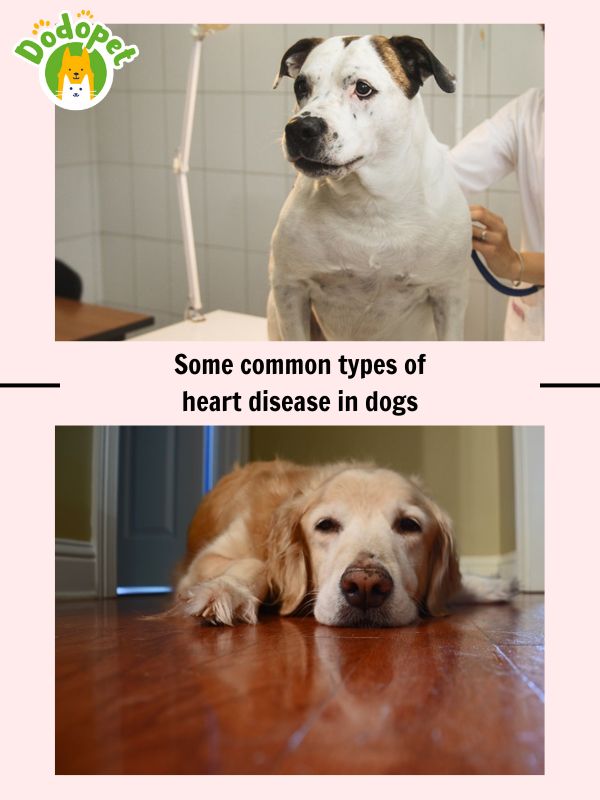Learn about the complex panorama of heart disease in dogs, including its symptoms, causes, and humane care. Navigate the world of canine heart health, strengthening your knowledge to protect your beloved friend’s health and guarantee a full, happy life.
Some common types of heart disease in dogs
Dogs are susceptible to a variety of heart conditions. Heart disease in dogs can be inherited or acquired. The most typical varieties include:
Congenital conditions that predispose dogs to heart disease in dogs
Congenital heart conditions are heart disease in dogs that are present at birth and result from developmental abnormalities during the formation of the heart and its structures. These conditions can affect the heart’s structure, function, and blood flow. Here are some common types of congenital heart diseases in dogs:
- Congestive Heart Failure (CHF): is a dangerous condition that frequently becomes worse that can afflict canines. This heart disease in dogs occurs when the heart’s capacity to pump blood effectively is harmed, which causes an accumulation of fluid throughout the body, especially in the lungs and other organs. CHF is a result of different underlying heart conditions.
- Canine Dilated Cardiomyopathy (DCM): is a particular kind of heart disease in dogs that impacts dogs and is defined by the expansion and weakness of the heart’s chambers, especially the left ventricle. This disorder causes the heart’s ability to pump blood more inefficiently, which could cause heart failure and poor circulation.
- Pulmonic Stenosis: is a canine congenital cardiac condition marked by a constriction or occlusion of the pulmonary artery or the pulmonic valve. The pulmonary artery, which transports blood to the lungs for oxygenation, is blocked by this obstruction, restricting blood flow from the right ventricle of the heart.
Dogs with congenital heart disease are less likely to have them than dogs with acquired heart disease.
Acquired conditions that predispose dogs to heart disease
Acquired conditions related to heart disease in dogs are medical conditions that appear after birth and have the potential to change the structure and operation of the heart over time. Age, lifestyle, illnesses, and other environmental factors are frequently contributors to these disorders. The following acquired disorders can aggravate heart disease in dogs:
- Canine Valvular disease: a collection of cardiac disorders known as canine valvular disease mostly affect dogs by causing the degeneration or deformity of their heart valves. Mitral valve disease (MVD), also known as chronic valvular degeneration, is the most prevalent valvular illness in canines.
- Arrhythmias: dogs can experience arrhythmias, which are irregular heartbeats, just like humans do. An arrhythmia is a departure from the typical electrical impulse pattern that controls the heartbeat. Arrhythmias may have a variety of origins and range in severity.
- Pericardial disease: conditions that affect the pericardium, the sac-like structure that surrounds the heart, are referred to as pericardial diseases. The outer fibrous layer and the inner serous layer are the two layers that make up the pericardium. The pericardium may have a variety of problems that affect how the heart works.
Whether congenital heart disease or acquired heart disease, heart disease in dogs is dangerous for your beloved dog. Don’t be subjective and take care of your dog.

Some common types of heart disease in dogs
Common symptoms of heart disease in dogs
Heart disease in dogs can present with a range of different signs, depending on the type of heart disease and severity. Here are some common signs associated with heart disease in dogs:
- Difficulty Breathing: shortness of breath or rapid, laborious breathing may be symptoms of dog heart disease.
- Coughing: coughing frequently, especially during or after vigorous activity, could indicate heart issues. A sound like hacking or gagging could accompany this.
- Weakness or Lethargy: your dog’s sudden weakness, weariness, or lethargic behavior may be a sign of a cardiac condition.
- Restlessness or Anxiety: dogs who are in discomfort or anguish may pace, act restless, or have trouble finding a comfortable position.
- Collapse or Fainting: although there are many possible causes for this symptom, sudden collapses or fainting spells may be related to cardiac problems.
- Pale Gums: your dog may have poor circulation and possibly heart issues if their gums appear pale or bluish.
- Loss of Appetite: a decrease in appetite, particularly if it is coupled with other symptoms, may indicate heart problems.
- Increased Heart Rate: while it could be difficult to correctly gauge your dog’s heart rate at home, a persistently high heart rate might be cause for concern.
- Swelling: congestive heart failure, which could occur after a heart attack, can manifest as swelling in the belly or limbs.
So, when your dog shows these signs, they may already have symptoms of heart disease in dogs. Therefore, you need to pay special attention to your pet dog to detect early signs of disease, examine and treat promptly.

Common symptoms of heart disease in dogs
Learn about the causes of heart disease in dogs
Heart disease in dogs can have various causes, ranging from genetic factors to acquired conditions. Understanding the potential causes of heart disease can help you recognize and manage the condition more effectively. Here are some common causes of heart disease in dogs:
- Heart Disease: heart disease is the most typical cause of heart-related issues in canines. This may include disorders like dilated cardiomyopathy (DCM), in which the heart muscles become weak, or valvular heart disease, in which the heart valves become damaged. These issues may result in decreased oxygenation, inadequate blood flow, and significant heart muscle injury.
- Arterial Blockages: just like in people, cholesterol and other chemicals can accumulate on the blood channel walls in dogs, leading to the development of arterial blockages. This may limit blood flow to the heart muscle and cause a deficiency of oxygen, which may harm heart tissue.
- Blood clots : blood clots that develop in blood vessels can impede blood flow and harm the heart muscle. Many things, including underlying cardiac disease, can cause this.
- Trauma: serious trauma or injury, like being struck by a car or being in a serious accident, can result in a sharp reduction in blood pressure and the oxygen flow to the heart, which may cause damage to the heart muscle. That can cause heart disease in dogs.
- Drug Reactions: some medicines or substances may have an impact on a dog’s cardiovascular system, causing irregular heartbeats or other problems that can lead to a heart-related event.
- Congenital Abnormalities: Some dogs are born with congenital heart defects, which might increase their risk of developing heart problems as they get older.
- Stress or Anxiety: extreme stress or anxiety can raise blood pressure and heart rate, potentially putting additional strain on the heart and raising the risk of heart-related issues.
- Obesity: Obesity can put stress on a dog’s circulatory system and raise their chance of developing heart disease and its complications.
- Age and Genetics: older dogs are typically more prone to heart issues, just like older people are. Additionally, some breeds are genetically predisposed to heart conditions.
- Other Health Conditions: heart-related disorders in dogs can be indirectly caused by underlying health conditions such thyroid troubles, kidney illness, and diabetes.
It’s crucial to remember that certain causes of heart disease in dogs can be controlled or avoided by following a healthy diet, getting regular exercise, taking precautions (such heartworm prevention), and receiving regular veterinary treatment.

Learn about the causes of heart disease in dogs
Methods to diagnose heart disease in dogs
It might be difficult to diagnose a heart attack in a dog since the symptoms may not be as obvious as they are in people. Veterinarians often concentrate on detecting underlying cardiac conditions and associated consequences rather than using the term “heart attack.” Veterinarians use a combination of clinical assessment, diagnostic tests, and medical history review to identify heart issues in dogs. Typical diagnostic procedures include:
- Observation and History: start by keeping an eye on the dog’s general demeanor, level of activity, and any behavioral changes. Ask the owner whether there has ever been any history of coughing, breathing issues, exercise intolerance, fainting episodes, or unexpected collapses.
- Respiratory Rate and Effort:keep an eye on the dog’s respiration and effort. Heart disease may be indicated by difficult breathing or an increased respiratory rate while at rest.
- Mucous Membranes and Capillary Refill Time: verify the mucous membranes’ and gums’ colors. Gums that are pale or bluish may not be properly oxygenated. By applying pressure to the gums and releasing it, you can determine the capillary refill time. It should quickly turn pink again.
- Heart Auscultation: to hear the heartbeats in various parts of the chest, use a stethoscope. Keep an ear out for strange noises like murmurs, gallops, or erratic rhythms.
- Pulse Assessment: to check the pulse, lightly press on the femoral artery. Analyze the rhythm and speed. Weak pulses and irregular heartbeats might be signs of abnormal heart conditions.
- Chest X-rays (Radiographs): chest X-rays, if available, can show the size and form of the heart as well as any indications of fluid buildup in the lungs (pulmonary edema).
- Abdominal Assessment: palpate the abdomen to feel for any enlarged organs or fluid buildup (ascites), which can be signs of heart disease.
- Edema: check for swelling or fluid buildup in the tummy or legs. Edema could be a sign of poor heart health.
- Weight and Body Condition: analyze the dog’s body condition score and weight. Obesity can make heart disease worse.
- Behavioral Changes: ask the dog about any changes in activity level, exercise willingness, or instances of fainting or collapsing.
- Coughing: when coughing frequently, especially at night or after exercise, which may be an indication of heart problems, let your doctor know.
- Pulse Oximetry (if available): using a pulse oximeter, determine the blood’s oxygen saturation level. Low oxygen saturation may indicate weakened heart health.
- Echocardiography (if available): a specialized ultrasound called an echocardiogram gives clear pictures of the structure and operation of the heart.
Keep in mind that a combination of physical examination, clinical indicators, and diagnostic procedures is required to diagnose cardiac disease. Consult a veterinarian immediately if you think your dog may have heart disease so they can perform a comprehensive assessment and recommend the best course of action.

Methods to diagnose heart disease in dogs
How to treat heart disease in dogs with care and expert guidance
The word “heart attack” in dogs may not exactly correspond to the idea in humans, despite the fact that dogs can have heart-related occurrences. Because underlying heart disorders can cause acute heart-related episodes in dogs, management of the underlying condition and symptom relief are the main goals of treatment. It’s critical to get your dog quick veterinarian care if you suspect a heart-related problem. When treating canine cardiac issues, physicians may follow the following steps:
- Stabilization: your dog’s condition must be stabilized as a top priority. The veterinarian will provide your dog prompt care to relieve any severe symptoms, such as trouble breathing, collapse, or weakness, if they are present or if your dog is in distress.
- Oxygen Therapy: to raise the blood’s oxygen levels in times of respiratory distress, your dog may receive oxygen therapy.
- Medications: the veterinarian may provide drugs to help manage heart-related problems depending on the underlying ailment. Diuretics to lessen fluid retention, drugs to enhance heart function, and medications to control irregular cardiac rhythms are examples of common pharmaceuticals.
- Pain Management: appropriate pain management techniques will be used if your dog is in pain or uncomfortable.
- Nutritional Support: a healthy diet can help you manage your heart issues. Depending on your dog’s demands and condition, your veterinarian may suggest a particular diet.
- Monitoring: tracking your dog’s response to treatment and making necessary adjustments to the treatment plan requires regular monitoring. Follow-up appointments, blood tests, and other diagnostic techniques can be necessary.
- Lifestyle Modifications: depending on the underlying issue, your veterinarian may advise making lifestyle adjustments like controlling your dog’s weight, limiting their exercise, and lowering their stress levels.
- Long-Term Management: many times, dogs with cardiac problems need continuing monitoring and care. Your veterinarian will collaborate with you to develop a long-term strategy that helps maintain the health of your dog and enhances their quality of life.
- Surgical Intervention: in some circumstances, surgical operations, such as the repair or replacement of heart valves, may be explored to address specific cardiac disorders.

How to treat heart disease in dogs with care and expert guidance
Taking care of your dog’s heart with love and knowledge
In conclusion, it is critical for our canine companions’ health to recognize and comprehend the heart disease in dogs symptoms. These symptoms, which can range from little adjustments to more obvious signals, are crucial warning markers of possible underlying cardiac conditions. We can quickly take action to seek veterinarian treatment and diagnosis by remaining alert and attentive to these indications.
It’s critical to keep in mind that the specific ailment, breed, age, and general state of health of the individual can all influence how heart disease in dogs presents. While some dogs may cough, feel tired, or have breathing problems, other dogs may exhibit less evident signs like a decreased tolerance for exercise or behavioral abnormalities.
Regular check-ups with a vet can help with early detection, particularly for senior dogs or breeds predisposed to heart problems. Auscultation, X-rays, echocardiography, and blood testing are examples of diagnostic techniques that allow for precise diagnosis and well-informed treatment choices.









